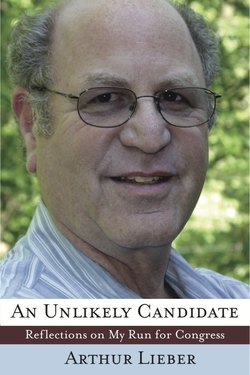Читать книгу An Unlikely Candidate: Reflections on My Run for Congress - Arthur Sr. Lieber - Страница 4
На сайте Литреса книга снята с продажи.
Introduction I Got My Butt Kicked, But . . .
ОглавлениеI ran for Congress in 2010; got my butt kicked; but all was not lost. On the surface it was a shellacking. Republican Todd Akin received 68%, I trailed at 29%, and Libertarian Steve Mosbacher garnered the other 3%. As I’ll demonstrate later, while losing by nearly 40 percentage points was humiliating, the results for the other 218 Democrats who lost on November 2 were also quite disappointing. I received 77,000 votes while spending $50,000, or about $0.64 per vote. This was less than 773 of the 841 candidates from the two major parties who ran that day.
I would have preferred an actual victory to go along with a moral one, but I am satisfied in accomplishing the two goals that I established other than gathering more votes than my opponents. First, I kept true to my commitment to neither solicit nor accept contributions; and second, I helped create a dialogue that was issue oriented and void of negative campaigning.
While this book is a personal account of my run for Congress, it is more importantly an assessment of the state of American politics in 2010, using my campaign for relevant reference points. Hopefully, it will provide helpful suggestions for improving our political process.
Our political system is nothing short of a mess. Democracy is compromised by the unseemly use of excessive money which candidates often use to paint distorted views of themselves and their opponents. In many cases, the media sits by and does little, somewhat akin to Nero just watching Rome burn. When the media does cover politics, it bears a certain similarity to how ESPN covers sports in its nightly wrap-ups (SportsCenter). What’s shown each night on SportsCenter? It’s the unusual—the outrageous and spectacular highlights. Mainstream coverage of politics shows the outrageous (loose lips), the car crashes (hypocrisy blatantly uncovered) and superficial highlights (a large rally which is thoroughly unrelated to the content of the candidate’s campaign or the issues that face the nation).
Politics is measured by how candidates do every two years in elections. But the interval between one election and other is far less than two years. Often a candidate wins one election and the next day begins plotting his or her campaign for reelection or to compete for a higher office. The system is geared towards immediate gratification characterized by dollars today, endorsements tomorrow, a constituent pleasing vote the next day, and finally victory in the election. Little time is available for reflection and study. It’s no wonder that our decision-makers live in a bubble, surrounding themselves primarily with people who can be of political or financial benefit to them.
None of our problems lend themselves to quick fixes. An education system that values conformity over creativity will not change in two years. A health-care system that is populated by a whole class of people whose job is to say “no” (insurance companies) will not become more patient oriented in two years. A foreign policy that is based on the false premise that America has never lost a war will not address reality overnight.
Fixing our political system so that it is capable of providing us with better government requires changes in five essential areas:
•We need candidates for public office who are much more thoughtful and committed to the public good than we currently have.
•We need a media that accurately portrays who our candidates are and gives equal attention to candidates who do not come from dynasties, wealth, or entrenched bases of power.
•We need schools that value the common good; that recognize that our country can be governed much better; that see that their primary role is to help students learn critical thinking skills and apply them for the benefit of society as a whole.
•We need to improve the current body politic. Citizens need to see meaningful reasons to vote. They need to learn how to engage in thoughtful dialogue with politicians, asking pertinent questions and not accepting simple slogans as the basis for policy.
•We need structural change in our government.
I will expand on these topics in depth in Part 2, but first I want to talk about how I came to run for Congress in Missouri’s Second District, and how my experience opened my eyes to what we need to do to fix our political system.
